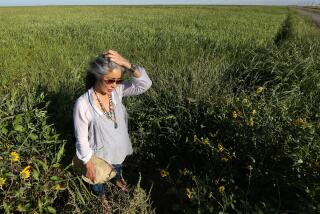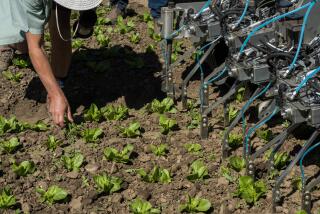A Legend That Grew Like Bamboo
SOUTH EL MONTE — The poster boy of the embattled California farmer can be found in South El Monte, deep in the guts of Greater Los Angeles. He occupies a low-slung cinder-block building on a street of low-slung cinder-block buildings, close by the Pomona Freeway. Fan palms spurt through the sidewalk here and there, and that’s about all that passes for agriculture on Max Shapiro Way.
Taung-Ming Lin’s neighbors manufacture pipes and plastic molds and steel parts and furniture. He runs a bookbinding plant. A stocky, fit-looking man of 51, Lin wears a polo shirt, polyester slacks and Reeboks. No cowboy boots or overalls for him. He sits on a black couch in his small corner office and, over the whump, whump, whump of machinery, lets his daughter interpret as he tells his unlikely story in Chinese.
It is a halting interview process, with much lost in translation. Asked early on to describe what it’s been like to become a national symbol of runaway environmentalism, to be remarked upon regularly by Rush Limbaugh and every politician under the California sun, Lin and his daughter confer with one another in Chinese, quietly, earnestly, for several minutes. Then she turns to the questioner and asks:
“Who is Rush Limbaugh?”
*
How to explain Limbaugh to this innocent? How to explain dittoheads? Limbaugh is the conservative commentator who earns his daily bread preaching to the choir on radio. Like Ronald Reagan, he loves anecdotes that speak to liberal intentions gone astray, and earlier this summer the matter of Taung-Ming Lin presented him with a doozy.
Lin had come to California three years ago from Taiwan on a visitor visa. He apparently had made a bundle selling refrigerators over there. In addition to the bookbinding business, he bought 700 acres of farmland west of Bakersfield. Actually, to call the piece a farm is a stretch. Bordered on one side by Interstate 5, the land is salty, overrun with sage and, at a price of $1.6 million, quite the opposite of a steal. Nonetheless, Lin looked at the land and imagined something more.
“His dream,” his daughter says, “was to retire someday and become a farmer. Not to make money, but for his own interest.”
Soon after he acquired the land, Lin instructed his hired man, Rico Sanchez, to plant five acres in bamboo. “He says you can eat it,” Sanchez later would say, sounding not at all convinced. The land, though, was so bad that many seedlings withered and died. Someone sold Lin “special water” to sprinkle on the soil, and Sanchez plowed some more. It was then the federal agents came, SWAT-style, and seized the tractor. They accused Lin and his hand of ignoring formal notice, of plowing up habitat of the endangered Tipton kangaroo rat.
“I saw no rats,” Lin says through his daughter. “I only saw rabbits and”--here they hold another long conference--”that red thing that climbs trees?”
Squirrels?
“Yes, squirrels. No rats.”
*
Even though there had been similar cases, this one took hold like none before. After Limbaugh came national newspaper correspondents and television crews, came political candidates and brother-farmers, who took Lin along on tractor rallies to the state Capitol and fund-raising barbecues up and down the valley. Along the way, they all have poured gasoline on what had been a relatively small fire of protest against the 1973 Endangered Species Act. Taung-Ming Lin has become the most important farmer in California, if not all America.
“He’s bigger than himself,” says Lin’s attorney. “He’s Forrest Gump.”
Lin seems a bit baffled by his role. “He wants to live a quiet life,” his daughter says. He will have to wait. For now, the legend is framed, the concrete is poured and hardened. And it doesn’t matter that Lin set out, not to feed the world, but to grow a little bamboo. It doesn’t matter that, though celebrated in country-Western song as one more family farmer on the run, he is a city man, a light industrialist. It doesn’t matter that, amid all the thunder about those mean old feds and enviro-freaks, Lin quietly has filed suit against the agricultural corporation that sold him the land--essentially charging that the company sold him a lousy piece of land without informing him it was inhabited by protected animals.
These nuances just get in the way of a better story, a modern political legend that, when the inevitable movie version is made, will star a farmer who looks and talks a lot like . . . Sam Shepard. Welcome to America, Mr. Lin.
More to Read
Sign up for Essential California
The most important California stories and recommendations in your inbox every morning.
You may occasionally receive promotional content from the Los Angeles Times.











